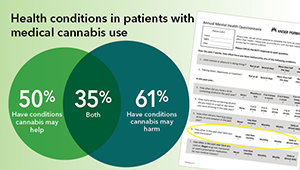Information Resources & Technologies
Kaiser Permanente Washington Health Research Institute (KPWHRI) staff can access and analyze decades of high-quality data across 4.5 million Kaiser Permanente Washington members and former members. KPWHRI also collaborates with many other large health-related research organizations, allowing study teams to combine populations for statistical power and diversity. With decades of experience in multi-site research projects, KPWHRI’s programmers and other staff members have developed special expertise at integrating and analyzing information from multiple health care plans and data systems.
Databases and programming
Kaiser Permanente Washington has a wealth of automated data available for research use, including administrative data such as insurance claims and health plan enrollment records, as well as patient care data from pharmacy, laboratory, hospital, and other systems that predate the advent of modern electronic health record (EHR) systems. The ability to combine health care utilization data with information on medical coverage allows KPWHRI researchers to report with confidence on patients’ complete health care experience.
Kaiser Permanente Washington data are stored on Microsoft Windows Server, UNIX, Oracle, SQL Server, and Teradata systems. Programs can extract information from all of these systems and integrate these data into the research environment for analysis.
KPWHRI programmers regularly use SAS, Python, R, REDCap, Microsoft Access, Microsoft SQL Server, and Microsoft Visual Studio.NET. They also draw from the free and open-source software community and employ tools for natural language processing and de-identifying textual data. Additionally, the distributed data models they build and maintain allow for interoperability with research collaborators including HCSRN’s Virtual Data Warehouse, the Sentinel Common Data Model, OHDSI’s OMOP Common Data Model, and previously the PCORNet Common Data Model.
Our staff’s familiarity with Kaiser Permanente Washington data and information systems results in short study startup times; high-quality, reliable data sets; and overall efficiency.
Medical records
Kaiser Permanente Washington's electronic health records (EHRs) enable targeted study recruitment, efficiently identifying potential participants based on age, sex, diagnosis, procedures, and other characteristics. Our ability to configure the EHR system also allows us to conduct clinical research interventions that modify care and workflows in the real-world setting.
The institute's medical-record reviewers are highly trained to abstract data from these records, following strict scientific protocols, ensuring data integrity, and protecting data security. They are also trained to protect patient privacy and confidentiality by following Kaiser Permanente Washington's standard policies and procedures for handling patient records.
Kaiser Permanente Washington patient care information is stored in Epic EHR. Reviewers also have access to a wealth of historic non-computerized medical charts that can be mined for diagnoses and medical history. Together, these resources provide an unequalled opportunity for health research and evaluation.
Learn more
From Kaiser Permanente Washington Health Research Institute
See Eric B. Larson, MD, MPH, on “big data”
FEATURED VIDEO
John Weeks, a senior research data warehouse engineer, presented at HCSRN’s 2021 conference regarding his team’s success in creating tools to transform data structures from the Virtual Data Warehouse into the ODHSI-OMOP data models. With the ability to quickly and accurately transform data so that it complies with this popular standard, KPHWRI can more nimbly compete for grant funding and collaborate with partners around the world.
Other Capabilities
New findings

Research roundup on natural language processing and machine learning
Using doctor's notes to learn about drug reactions, dementia, and cannabis use.
video

A deep dive into KPWHRI’s Virtual Data Warehouse
Experts in health data discuss a widely used data model — its origin, organization, and current applications.
Electronic health records

EHR study offers insights on medical cannabis use
New research examines providers’ notes to understand patients’ cannabis use and health conditions.



